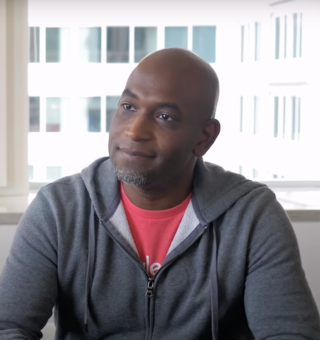Microsoft Azure, often referred to as Azure, is a cloud computing platform developed by Microsoft. It offers access, management, and the development of applications and services through global data centers. It also provides a range of capabilities, including software as a service (SaaS), platform as a service (PaaS), and infrastructure as a service (IaaS). Microsoft Azure supports many programming languages, tools, and frameworks, including Microsoft-specific and third-party software and systems.
Linode, LLC was an American cloud hosting provider that focused on providing Linux-based virtual machines, cloud infrastructure, and managed services.
Twilio Inc. is an American cloud communications company based in San Francisco, California, which provides programmable communication tools for making and receiving phone calls, sending and receiving text messages, and performing other communication functions using its web service APIs.

OpenShift is a family of containerization software products developed by Red Hat. Its flagship product is the OpenShift Container Platform — a hybrid cloud platform as a service built around Linux containers orchestrated and managed by Kubernetes on a foundation of Red Hat Enterprise Linux. The family's other products provide this platform through different environments: OKD serves as the community-driven upstream, Several deployment methods are available including self-managed, cloud native under ROSA, ARO and RHOIC on AWS, Azure, and IBM Cloud respectively, OpenShift Online as software as a service, and OpenShift Dedicated as a managed service.
Docker is a set of platform as a service (PaaS) products that use OS-level virtualization to deliver software in packages called containers. The service has both free and premium tiers. The software that hosts the containers is called Docker Engine. It was first released in 2013 and is developed by Docker, Inc.
Google Cloud Platform (GCP), offered by Google, is a suite of cloud computing services that provides a series of modular cloud services including computing, data storage, data analytics, and machine learning, alongside a set of management tools. It runs on the same infrastructure that Google uses internally for its end-user products, such as Google Search, Gmail, and Google Docs, according to Verma, et.al. Registration requires a credit card or bank account details.
Kubernetes is an open-source container orchestration system for automating software deployment, scaling, and management. Originally designed by Google, the project is now maintained by a worldwide community of contributors, and the trademark is held by the Cloud Native Computing Foundation.

Mirantis Inc. is a Campbell, California, based B2B open source cloud computing software and services company. Its primary container and cloud management products, part of the Mirantis Cloud Native Platform suite of products, are Mirantis Container Cloud and Mirantis Kubernetes Engine. The company focuses on the development and support of container and cloud infrastructure management platforms based on Kubernetes and OpenStack. The company was founded in 1999 by Alex Freedland and Boris Renski. It was one of the founding members of the OpenStack Foundation, a non-profit corporate entity established in September, 2012 to promote OpenStack software and its community. Mirantis has been an active member of the Cloud Native Computing Foundation since 2016.

Dynatrace, Inc. is a global technology company that provides a software observability platform based on artificial intelligence (AI) and automation. Dynatrace technologies are used to monitor, analyze, and optimize application performance, software development and security practices, IT infrastructure, and user experience for businesses and government agencies throughout the world.
Serverless computing is a cloud computing execution model in which the cloud provider allocates machine resources on demand, taking care of the servers on behalf of their customers. "Serverless" is a misnomer in the sense that servers are still used by cloud service providers to execute code for developers. However, developers of serverless applications are not concerned with capacity planning, configuration, management, maintenance, fault tolerance, or scaling of containers, VMs, or physical servers. Serverless computing does not hold resources in volatile memory; computing is rather done in short bursts with the results persisted to storage. When an app is not in use, there are no computing resources allocated to the app. Pricing is based on the actual amount of resources consumed by an application. It can be a form of utility computing.
Docker, Inc. is an American technology company that develops productivity tools built around Docker, which automates the deployment of code inside software containers. Major commercial products of the company are Docker Hub, a central repository of containers, Docker Desktop, a GUI application for Windows and Mac to manage containers. The historic offering was Docker Enterprise PaaS business, acquired by Mirantis. The company is also an active contributor to various CNCF projects, such as containerd and runC. The main open source offering of the company are Docker Engine and buildkit which are rebranded under the Moby umbrella project. The core specification, Dockerfile, still includes the company trademark, however.

Dan Kohn was an American serial entrepreneur and nonprofit executive who led the Linux Foundation's Public Health initiative. He was the executive director at Cloud Native Computing Foundation (CNCF), which sustains and integrates open source cloud software including Kubernetes and Fluentd, through 2020. The first company he founded, NetMarket, conducted the first secure commercial transaction on the web in 1994.

Prometheus is a free software application used for event monitoring and alerting. It records metrics in a time series database built using an HTTP pull model, with flexible queries and real-time alerting. The project is written in Go and licensed under the Apache 2 License, with source code available on GitHub, and is a graduated project of the Cloud Native Computing Foundation, along with Kubernetes and Envoy.
Container Linux is a discontinued open-source lightweight operating system based on the Linux kernel and designed for providing infrastructure for clustered deployments. One of its focuses was scalability. As an operating system, Container Linux provided only the minimal functionality required for deploying applications inside software containers, together with built-in mechanisms for service discovery and configuration sharing.
TiDB is an open-source NewSQL database that supports Hybrid Transactional and Analytical Processing (HTAP) workloads. Designed to be MySQL compatible, it is developed and supported primarily by PingCAP and licensed under Apache 2.0. It is also available as a paid product. TiDB drew its initial design inspiration from Google's Spanner and F1 papers.
The Cloud Native Computing Foundation (CNCF) is a Linux Foundation project that was started in 2015 to help advance container technology and align the tech industry around its evolution.
A cloud-native network function (CNF) is a software-implementation of a function, or application, traditionally performed on a physical device, but which runs inside Linux containers. The features that differ CNFs from VNFs, one of the components of network function virtualization, is the approach in their orchestration.

Kelsey Hightower is an American software engineer, developer advocate, and speaker known for his work with Kubernetes, open-source software, and cloud computing.

eBPF is a technology that can run programs in a privileged context such as the operating system kernel. It is the successor to the Berkeley Packet Filter (BPF) filtering mechanism in Linux, and is also used in other parts of the Linux kernel as well.

Cilium is a cloud native technology for networking, observability, and security. It is based on the kernel technology eBPF, originally for better networking performance, and now leverages many additional features for different use cases. The core networking component has evolved from only providing a flat Layer 3 network for containers to including advanced networking features, like BGP and Service mesh, within a Kubernetes cluster, across multiple clusters, and connecting with the world outside Kubernetes. Hubble was created as the network observability component and Tetragon was later added for security observability and runtime enforcement. Cilium runs on Linux and is one of the first eBPF applications being ported to Microsoft Windows through the eBPF on Windows project.








